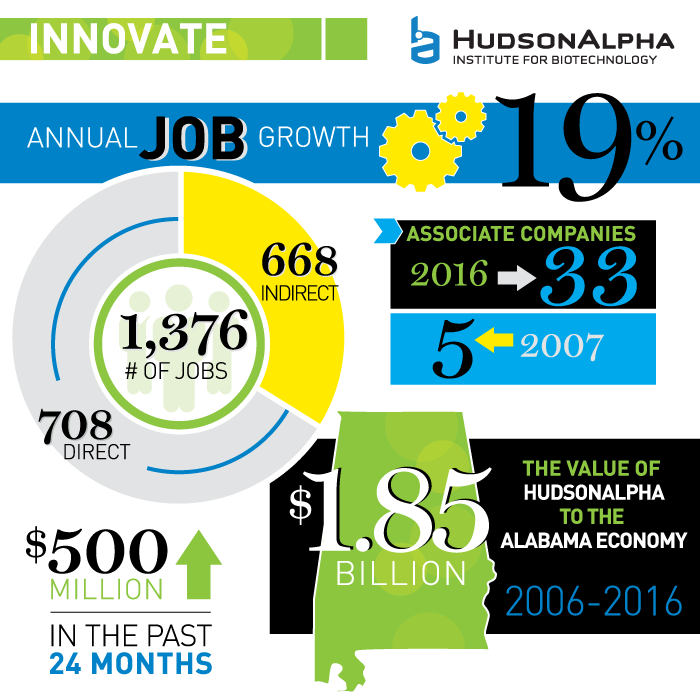Huntsville, Ala. — HudsonAlpha Institute for Biotechnology has generated more than $1.85 billion in economic impact for the state of Alabama, according to a recent study by the University of Alabama in Huntsville (UAH). In the past two years, the economic impact has been more than $500 million.
HudsonAlpha and the associate companies co-located on the life sciences campus have shown 19 percent job growth in the past year – compared to the national job growth rate of 1.8 percent – with a lifetime growth rate of 25 percent.
“We know that HudsonAlpha adds extraordinary economic value to the state of Alabama, and we’re excited to see these numbers continue to increase,” said Rick Myers, PhD, HudsonAlpha’s president and science director. “These figures reflect what we see every day on our campus – excitement about the life sciences sector in our regional economy and consistent growth of Alabama as a leader in the biosciences industry.” 
The economic impact analysis was prepared by the Center for Management & Economic Research at UAH and includes data from 2006-2016. The study reflects the impact of the entire biotech campus, combining economic data and impact from the nonprofit HudsonAlpha as well as more than 30 resident associate companies. Economic impact estimations summarize the impacts of an entity on the specified economy, summarizing the impact of the monetary value and jobs resulting from the presence of HudsonAlpha in our region.
“HudsonAlpha and the associate companies have over 750 people on campus today. We are a key driver in this important North Alabama economic sector, but there are over 2,000 additional people working in the life sciences in Madison County alone,” said Carter Wells, HudsonAlpha vice president for economic development. “The findings from this study have re-energized all of us to keep focused on entrepreneurship, recruitment and business expansion as we continue to build a vibrant life sciences hub.”
This growth reported in the economic impact study has generated more than 1,376 direct and multiplier jobs with a total $634 million in direct and indirect payroll impact over the last 11 years. In particular, the companies on campus have shown steady growth in four key bioscience sub-sectors, with a diversification emphasizing growth in the drug and pharmaceutical sub-sector.
“A little over a decade ago, Lonnie McMillian and I envisioned a life sciences campus that would become a biotech hub for the Southeast,” said Jim Hudson, co-founder of HudsonAlpha. “This new study shows that our model is not only successful, but it is exceeding our expectations.”
The Institute’s model of genomic research, educational outreach, genomic medicine and bioscience companies on one collaborative campus creates an ecosystem of success for start-up companies and small businesses.
Bioscience start-ups on HudsonAlpha’s campus leverage the advantages of the expanding life sciences ecosystem. Evidence from the recent study shows an increasing average company longevity rising to approximately five years, outpacing the typical start-up’s lifespan.
The bioscience ecosystem at HudsonAlpha is positively impacting the economy and the companies choosing to locate on the collaborative campus.
“The growth of Diatherix has been in a large part due to our location and relationship with HudsonAlpha. From talent acquisition to outstanding lab space, HudsonAlpha has been key to our success,” said Dennis Grimaud, CEO of Diatherix Laboratories. “Having entrepreneurs, educators and scientists together in a collaborative environment benefits all involved”.
About HudsonAlpha: HudsonAlpha Institute for Biotechnology is a nonprofit institute dedicated to innovating in the field of genomic technology and sciences across a spectrum of biological challenges. Opened in 2008, its mission is four-fold: sparking scientific discoveries that can impact human health and well-being; bringing genomic medicine into clinical care; fostering life sciences entrepreneurship and business growth; and encouraging the creation of a genomics-literate workforce and society. The HudsonAlpha biotechnology campus consists of 152 acres nestled within Cummings Research Park, the nation’s second largest research park. Designed to be a hothouse of biotech economic development, HudsonAlpha’s state-of-the-art facilities co-locate nonprofit scientific researchers with entrepreneurs and educators. The relationships formed on the HudsonAlpha campus encourage collaborations that produce advances in medicine and agriculture. Under the leadership of Dr. Richard M. Myers, a key collaborator on the Human Genome Project, HudsonAlpha has become a national and international leader in genetics and genomics research and biotech education, and includes more than 30 diverse biotech companies on campus. To learn more about HudsonAlpha, visit: http://hudsonalpha.org/.
HudsonAlpha Media Contact:
Margetta Thomas
mthomas@hudsonalpha.org
256-327-0425

